Issue 90 : 19 September 2021
Talofa Lava, Kia Orana, Malo E Leilei, Tena Koutou, Hello ...
... and welcome to the latest issue of “For The Love Of The Game”, the official e-zine of the New Zealand Amateur Sport Association Inc., founded in 2017.
If you have any feedback on this issue, ideas for future articles, or would like to contact the Editor, please click here. And, you are invited to forward the e-zine to others you know, who may be interested in reading it. An archive of earlier editions of the e-zine can be found here. For those who follow Twitter, you can also follow the Association, @AmateurSportNZ.
If you are interested in applying for membership of the Association, please click here.
Association Welcomes New Members ...
Sport Waitakere and the Kumeu Cricket Club have both joined the Association this month, as a “Regional Sport Organisation” member and a “Community Club” member respectively. The Association’s Board welcomes their involvement and support of the Association’s goals.
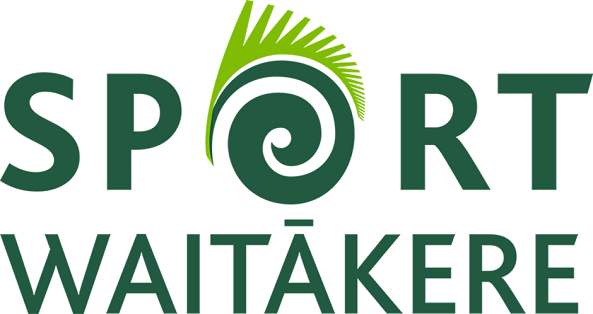
Sport Waitakere works within the boundaries of Auckland Council’s three local boards: the Whau Local Board; the Waitākere Ranges Local Board and the Henderson-Massey Local Board to provide sport programmes, workshops, activations, mentoring, resources, events and support at low to no cost to the local community. The Sport Waitakere team works alongside schools, clubs, volunteers and community groups to improve the quality and accessibility of sport.
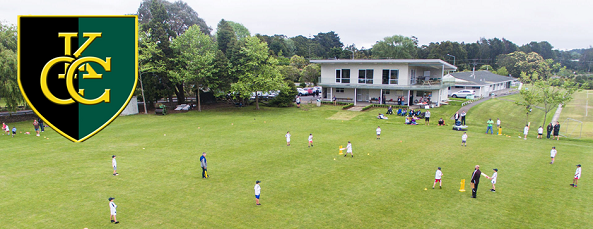
The Kumeu Cricket Club (northwest of Auckland City) was first formed over 75 years ago and is based at the Huapai Recreation Reserve in Kumeu. The Club provides community cricket for all ages. Over the last few seasons, the Club’s local community has experienced rapid urbanisation creating new pressures on resources and volunteers. In joining the Association, the Club hopes to benefit from "strength in numbers” in working with its local authority and community funders.
High Response Rate To 2021 National Sport Club Survey ...
Around 1,200 sport clubs from throughout New Zealand have responded to the 2021 National Sport Club Survey, representing 85 different sporting codes. The Auckland, Wellington and Christchurch regions (comprising around 60% of New Zealand’s population) represented just under half of total survey responses received, with the top five sports (by number of survey responses) this year being Bowls (Lawn and Indoor), Golf, Tennis, Rugby Union and Croquet.
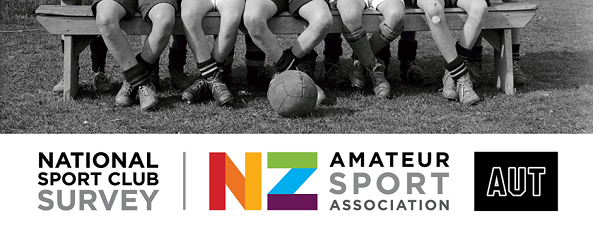
New Zealand’s first Census of Sport was taken nearly 100 years ago in 1924, at which time (excluding those who followed horse-racing), the top five sports in New Zealand (by numbers of participants) were Rugby Union, Lawn Tennis, Lawn Bowls, Golf and Cricket. The 2021 National Sport Club Survey results will provide insight into how these sports (and others) are faring today.
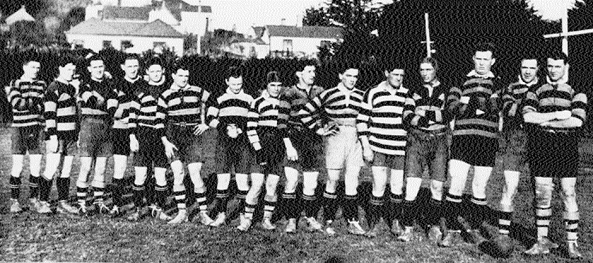
(The Kaikorai RFC team of 1924, when Rugby Union was the largest sport in the nation)
Of note, given the Association’s active involvement in lobbying for community sport through the current reform of the Incorporated Societies Act, 82% of survey respondents confirmed that they were registered as incorporated societies, with incorporated sport clubs (with an average membership of 200) reporting more members than unincorporated clubs.
An initial Media Release is intended later this month, providing initial insights from this year’s data, with regional workshops planned for November. More details will follow in due course.
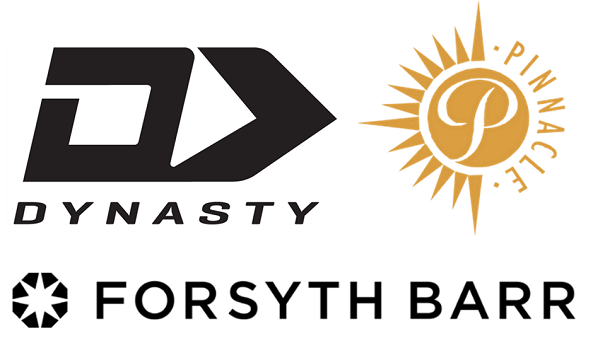
(The NSCS would not be possible without the generous support of all our sponsors)
Hokitika Tragedy Remembered In Woodham Shield Legacy ...
A tragic firearms accident in the Hokitika Gorge in 1949 brought a community together, through sport. Last week, Radio New Zealand’s "Country Life" broadcast the story of the "Woodham Shield", a fierce rugby rivalry played in South Westland.
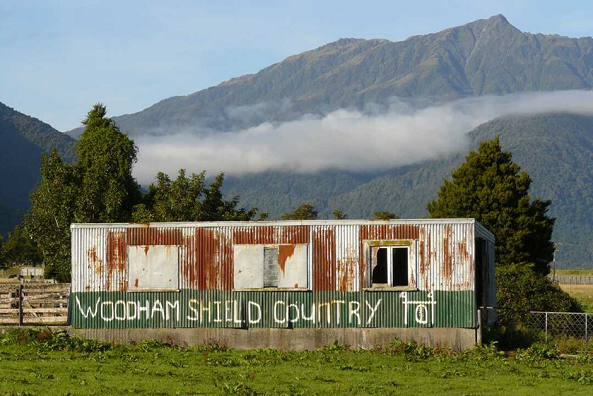
(South Westland is colloquially known as "Woodham Shield Country")
George Frederick Woodham was born in 1927 in Hokitika, the son of Frederick Reeve and Elizabeth Mary Woodham (nee Durnford), dairy farmers of Evans' Creek, near Lake Ianthe in Hari Hari. George died tragically on 3 September 1949. He played rugby union for the Hari Hari Football Club in the years following World War 2. Following his death in 1949, his father presented a shield “to the football clubs in South Westland, from Ross southwards, in memory of our late son George”. The first match for the Woodham Shield was played between Ross and Hari Hari. Originally the competition comprised five teams including Whataroa, Fox and Franz. Fox and Franz combined with Haast to form the "south team".
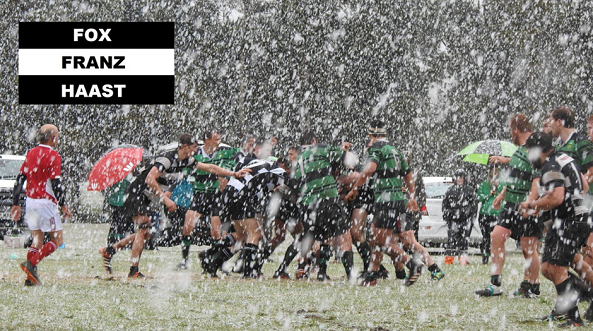
(The 2019 "Woodham Shield" final, was played in blizzard-like conditions)
The competition for the Shield has continued uninterrupted for the subsequent 72 years, with the 2021 Shield winners being Whataroa. You can listen to "Country Life's" broadcast through the Association’s web-site using the Media Player, by clicking here.
Nine Recommended Volunteer Management Practices ...
Noting that organisations that have trouble recruiting volunteers also have trouble retaining them, a study by “The Urban Institute” of 3,000 charitable organisations in the United States, outlines nine recommended volunteer management practices to improve volunteer participation.

These are: supervision and communication, liability coverage (e.g. in New Zealand, cover under Association Combined Liability Insurance), screening and matching volunteers to jobs, regular collection of information on volunteer involvement, written policies and job descriptions, recognition activities, annual measurement of volunteer impact, training and professional development for volunteers, and training for paid staff in working with volunteers.

The study found that, while these best practices are widely known by many organisations, they are not widely adopted. Overall, the study (you can read the full report here), suggests that organisations should allocate sufficient funds to support volunteer involvement, cultivate an organisational climate that is welcoming to volunteers, give their volunteers an experience worth sharing, and enlist volunteers in recruiting other volunteers one on-one.
These are great suggestions for all amateur sport clubs throughout New Zealand!
Clubs Reminded Of COVID-19 Obligations ...
In welcoming the easing of COVID-19 regulatory restrictions in areas outside of Auckland, the Association reminds clubs of their obligations when resuming activity in their local communities.
Under COVID-19 Delta Alert Level 2, sport clubs can resume their activities, subject to each sport club: meeting its statutory obligations (as described under the COVID-19 Public Health Response Act 2020 (the Act) and its associated regulations); abiding by the directives of their national governing body (if they are affiliated to a national governing body); and considering the guidelines provided by other third-party entities (for example, local body entities who control grounds and infrastructure), which may have relevance to their operations.
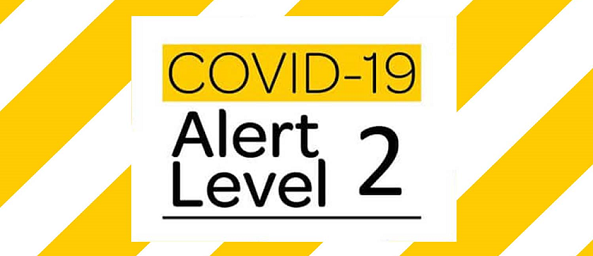
Generally, it is the responsibility of a sport club itself to meet these obligations, provided the club is incorporated. However, if a person acting on behalf of the sport club knowingly acts (or knowingly fails to act) in such a way to circumvent the sport club’s statutory obligations, there is the potential for that person to face prosecution for the sport club’s failure to comply.
Where a sport club is not incorporated or has been involuntarily dissolved by the Registrar and is continuing to operate, liability under the Act for any acts (or omissions) could fall on the individuals purporting to act on behalf of the club.
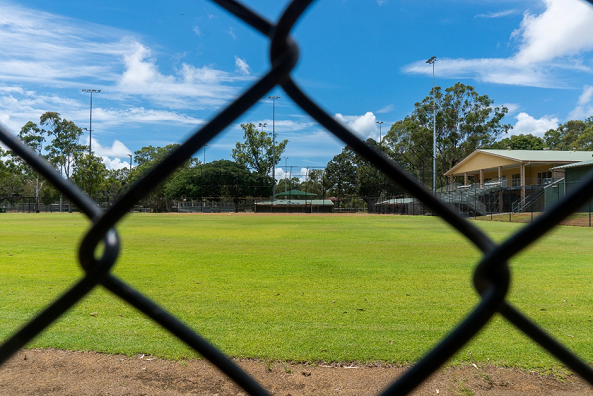
(Sport clubs are reminded of their obligations under COVID-19 Alert Level 2)
This is a very timely reminder for all sport clubs to check their incorporated status, as an immediate priority. The Association recommends that all sport clubs ensure that their plans fully comply with all the Act’s regulations, confirm their understanding of any additional obligations they have to their national governing bodies and also to consult with their local authority, where they use, share or lease sport facilities.
“Egregious And Unreasonable” – The Incorporated Societies Bill ...
“Egregious and unreasonable”, is how Chapman Tripp one of New Zealand’s largest law firms says clauses 53 and 54 of the Incorporated Societies Bill (regarding "Officers Duties") can be perceived, noting that these clause have a “disproportionally burdensome effect”, which may deter volunteers becoming Officers for their organisation. Chapman Tripp's supplementary submission on the Incorporated Societies Bill (click here to read the submission), notes that the Bill’s one-size-fits-all approach, in particular the inclusion of clauses 53 and 54, is inappropriate and should not be included in the new Incorporated Societies Act at this time.

(The Select Committee report on the new Bill is due on Wednesday, 6 October)
In support of this view, Chapman Tripp note that incorporated societies ... are usually not-for-profit, are akin to charities, and ought not to attract an overly onerous standard of duties; that clauses 53 and 54 would have a disproportionately burdensome effect and may deter future Officers from undertaking managerial or administrative functions in incorporated societies; that incorporated societies are not overflowing with legal and commercial experts and are often scant in resources and skills; and therefore to place such onerous duties on ordinary members of the public, has potentially ruinous consequences.

From The Archives ...
OTAGO DAILY TIMES, ISSUE 26101, 14 MARCH 1946, PAGE 2
A GREAT GIRL
“Beaten every lime she started at the Women’s Athletic Championships at Carisbrook, Miss Nancy Hanlin contributed probably more than anyone else to the success of the meeting. A few days before the meeting someone was wanted to make the flags - Nancy! Someone had to organise the arrangements to billet a large number of visitors - Nancy! The result was that when a young athlete should have been resting, she was burning the midnight oil and did not do herself justice at the time of competition.
While Miss Hanlin, who look the Olympic oath on behalf of all the competitors, was not able to win a title, the crowd gave her efforts in her best event - the Shot Put - sufficient encouragement to indicate that they appreciated her splendid work for the sport. She has a magnificent record, both as a competitor and an administrator in Otago sports.”
Annie (Nancy) Hanlin was born on 29 May 1920, at “The Roseken”, Mosgiel, the daughter and only child of Walter Dick and Annie Orr (nee Livingston) Hanlin. Nancy’s father was born in Pollokshaws, Glasgow and emigrated with his parents to Otago in 1909. Nancy’s parents married on 27 July 1918 in Glasgow, at the end of the Great War (and divorced in 1957). The Hanlin family were heavily involved in amateur sport. Walter was a well-known Otago sportsman and horticulturist, playing Association Football for the Southern, Taieri and Seacliff clubs and representing Otago in the 1920’s, later becoming an Otago football referee.
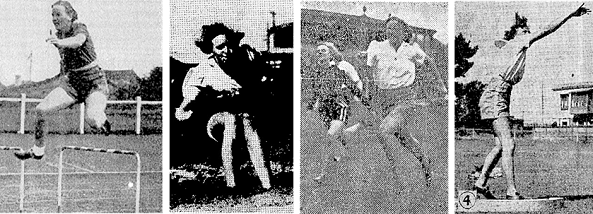
(Nancy Hanlin excelled in a range of track and field athletic sports in the 1940’s)
As a three-year-old, Nancy suffered a horrific accident when while her mother was chopping wood, Nancy, “ran towards her and placed her hand on the chopping block … severing one finger completely and badly damaging two others”. Despite her physical injury as a young child, while at Dunedin's Caversham Primary School, Nancy showed considerable athletic talent both on the track and in the field.
She represented Otago in “basketball” (the name for "netball" in the pre World War 2 era) in her late-teens. A member of the Dunedin Athletic Club, Nancy was prominent in a number of athletic events through the 1940’s including the hurdles, discus, long jump and javelin. Notably, she broke the Women’s Otago Shot-Put record in 1940, becoming the New Zealand champion and going on to break the New Zealand record in 1941 with a throw of 32 feet, 10 inches. She held the record for six years, before it was broken by another famous Otago athlete, Yvette Williams.
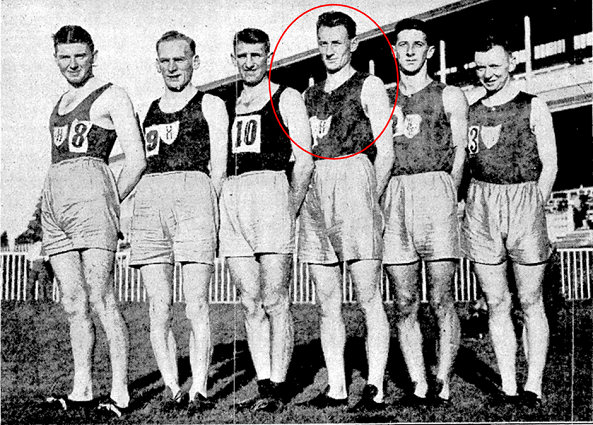
(Dick Whittleston - circled - served Otago amateur sport with his wife Nancy for many years)
Following World War 2, Nancy married Richard (Dick) Whittleston, a member and timekeeper of the Otago Centre of the New Zealand Amateur Athletic Association and quarter-mile runner of the Civil Service Athletic Club. During the War, Nancy served in the Royal New Zealand Air Force, Women's Auxiliary Air Force (WAAF), while her future husband served in the Navy. A member of the YWCA, Nancy also represented Otago in cricket. In 1963, Nancy was made Life Member of Dunedin Netball also receiving a New Zealand Service Award in 1976, while Dick received a service award from Dunedin Netball in 1981. After contributing to sport in the Otago region at all levels throughout their lives, Richard died in 1989 and Nancy in 2009.
The Final Word ...
"Although the promise of achievement can propel us forward, it comes with pitfalls that can undermine the satisfaction of actually achieving."
(Joe Pinsker, "The Atlantic")